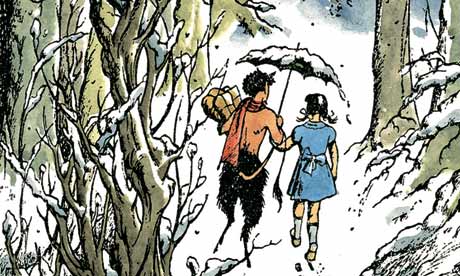In the Atlantic magazine this month, there is a review of a new book chronicling the lives of the Inklings, that informal Oxford club of writers that included J.R.R Tolkien and C.S. Lewis. The group was an informal gathering whose primary requirements for entry were “a tendency to write and Christianity.”
These were authors who were deeply affected by their experiences in the First World War. Seemingly rejecting the mannered Christianity of their youth, they seemed to instead be drawn into something deeper and more powerfully mythical in response to the horrors unleashed by the industrialization of human conflict.
From the review;
We think of the Inklings as traditionalists, red faces scowling upon modernity. Lewis, in particular, polemicized fruitily against materialism, atheism, 20th-century-man-ism. On the other hand, what more modernist project could there be than Tolkien’s “construction of an art-language,” with the obsessive completeness of its declensions and long-dead kings? Blown sky-high—just like the modernists—by the psychic rupture of the Great War, the Inklings responded not with fragmentation and pessimism but with a redoubled commitment to the world behind the world, freshly visible through this new rip in the fabric. The “intersection of the timeless / With time,” T. S. Eliot called it.
That kind of response resonates with many. Perhaps even the twentieth century’s Liturgical Renewal movement, which brought about a new relationship with the ancient church and culminated in the then-radical Prayer Book revision of 1979 can been seen as a response to modernism that sought to root the Christian community in ancient and fertile soil.
But theirs’ wasn’t the only response. A competing philosophy was that created by Ayn Rand, a Russian émigré seeking to escape the volatility of the Russian Revolution (itself a response to the WWI). One can hardly imagine a worldview more alien to that of the Inkling’s than Rand’s Objectivism. Author John Rogers once observed that “(t)here are two novels that can change a bookish fourteen-year old’s life: The Lord of the Rings and Atlas Shrugged. One is a childish fantasy that often engenders a lifelong obsession with its unbelievable heroes, leading to an emotionally stunted, socially crippled adulthood, unable to deal with the real world. The other, of course, involves orcs.”
And of course, unlike the Inkling’s embrace of Christianity, Rand clearly rejected God and any sense of collective action or responsibility, saying;
“I am done with the monster of “we,” the word of serfdom, of plunder, of misery, falsehood and shame. And now I see the face of god, and I raise this god over the earth, this god whom men have sought since men came into being, this god who will grant them joy and peace and pride. This god, this one word: “I.”
And now, in short series of hilarious (and kind of disturbing) “adaptations” the blogger Mallory Ortberg at her blog, the Toast has shown the true awfulness of Randian philosophy by imagining a Narnia remade in the spirit of Atlas Shrugged.
An example:
“Thank you for your hospitality,” Susan said politely, “but we really have to go.”
Mr. Beaver’s face fell. “Oh, you can’t just leave.”
“He’s right. We have to help Mr. Tumnus,” Lucy said.
“We don’t have to do anything,” Aslan reminded her. “Mr. Tumnus’ troubles sound like a Mr. Tumnus problem.”
Lucy helped herself to another slice of cake instead of chasing after a pantsless man-goat who had failed to guard his own self-interest, and was all the happier for it.
Go check them all out here

